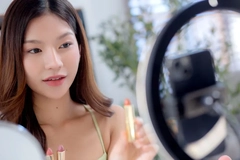
01 Nov 2021 --- The Metaverse era is upon us with global brands ushering consumers into the digital world and its near infinite potential. With the support of AI and AR, industry is spearheading digital beauty innovation giving rise to advanced e-commerce, cosmetics tech and “phygital” solutions. Experts speak to PersonalCareInsights about how these can boost personalization and consumer engagement, as well as accelerate creativity in NPD.
“Digital solutions are crucial for industry to better listen and understand consumers, to explore new creative routes and augment the creative processes,” says Arnaud Guggenbuhl, head of global marketing, insights and image, fine fragrance at Givaudan.
From 3D commerce to social commerce and beauty devices, these new digital solutions offer personalization, boost brand visibility and are often more convenient for the consumers. 
“As the beauty industry and beauty consumers continue to evolve, interactive and personalized digital shopping experiences will be essential to drive customer engagement,” says Adam Gam, Perfect Corp.’s CMO.
“Consumers will come to expect AR virtual try on technology and AI-powered diagnostics when shopping and these experiences will become a must-have component of the omni-channel shopping journey,” he details.
“They will expect high-touch, personalized recommendations and advice from brands across all shopping touch points, whether online, in store, or through social commerce channels. Beauty tech is necessary to create these experiences.”
The Metaverse universe
With the Metaverse concept taking industry by storm, personal care heavyweights are making the switch to digital, while maintaining brick and mortar options with a niche appeal.
 Kao Corporation’s prestige brand Sensai unveiled “Silk Skin Checker," an online skin analysis tool powered by AI.The Metaverse is an iteration of the internet part of shared virtual reality, often as a form of social media. The metaverse in a broader sense may not only refer to virtual worlds operated by social media companies but the entire spectrum of AR.
Kao Corporation’s prestige brand Sensai unveiled “Silk Skin Checker," an online skin analysis tool powered by AI.The Metaverse is an iteration of the internet part of shared virtual reality, often as a form of social media. The metaverse in a broader sense may not only refer to virtual worlds operated by social media companies but the entire spectrum of AR.
With this in mind, Clinique recently modernized its consumer experiences and established a new presence in the metaverse with the launch of the brand’s first digital collectible represented by a limited edition non-fungible token (NFT).
A NFT is a unique and non-interchangeable unit of data stored on a digital ledger. Clinique has created just three editions of its first NFT, called “MetaOptimist.”
“NFTs are a contemporary way to celebrate loyalty and put our consumers in the driver's seat, with storytelling and engagement at its core,” says Carolyn Dawkins, senior VP of Clinique global online, consumer engagement and product marketing.
An e-commerce pandemic
At the beginning of the COVID-19 pandemic, store closures and social distancing mandates led many beauty consumers to turn to digital channels for beauty advice and inspiration, according to Perfect Corp.’s Gam.
In Perfect Corp.’s latest global beauty trend report, the consumer shift toward digital beauty product advice, inspiration and product discovery is more evident than ever before.
“This data shows us that the beauty industry will continue to experience a digital transformation and brands will need to adapt to effectively engage consumers.”
“According to the big data analyzed in Perfect Corp.’s YouCam Makeup app community, this shift towards digital inspiration and digital product discovery will persist post pandemic. There have been over 17 billion beauty virtual try-ons in the YouCam Makeup app in 2021,” Gam explains.
E-commerce is indeed experiencing a boom in popularity with L’Oréal reporting “powerful” growth at the end of September 2021, supported by a 29.7% growth in e-commerce. Meanwhile, Unilever revealed a strong performance in its Q3 results, driven by an e-commerce rise of 38%, which was boosted by the acquisition of DTC brand Paula’s Choice earlier this year.
“During the pandemic, there was a significant consumer shift to skincare over makeup. In the data from our survey, we see that this trend is persisting post-pandemic. Consumers are now seeking out personalized skincare regimens and makeup products that provide moisture and skin benefits, such as hydrating lip gloss and sheer lipstick,” Gam notes.
 L’Oréal reported “powerful” growth at the end of September 2021, supported by a 29.7% growth in e-commerce.Perfect Corp entered a multi-channel agreement with industry behemoth Coty to boost personalization and improve consumers’ digital experience for its Kylie Cosmetics and Covergirl brands.
L’Oréal reported “powerful” growth at the end of September 2021, supported by a 29.7% growth in e-commerce.Perfect Corp entered a multi-channel agreement with industry behemoth Coty to boost personalization and improve consumers’ digital experience for its Kylie Cosmetics and Covergirl brands.
Moreover, Lancôme recently unveiled a virtual UK pop-up store powered by ByondXR, which promises to boost consumer engagement to new heights. ByondXR CEO, Noam Levavi, says social commerce and 3D e-commerce are important assets for big brands to boost consumer engagement.
Since first launching with ByondXR in February 2021, Lancôme saw a 350% increase in customer engagement time in its virtual stores.
“Emerging technologies are becoming an outlet for brands to appeal to the largest-growing shopper segment around the world – Gen Z,” Levavi says.
Phygital solutions
To ensure successful NPD and satisfied customers, many companies are turning to digital tech. For example, Givaudan launched DigiPulse to decode consumers’ online spontaneous comments about fine fragrances.
The AI-powered technology is marketed as the first olfactive social listening tool. “It is able to promote fragrances into a ‘smell without smelling’ ecommerce environment,” notes Guggenbuhl.
“The world is switching not to digital commerce but to ‘phygital’ commerce for good, mixing physical and digital environments to always propose more intense experiences and simplified transactional interactions with consumers.”
 According to the big data analyzed in Perfect Corp.’s YouCam Makeup app community, this shift towards digital inspiration and digital product discovery will persist post pandemic. “We estimate that the results are absolutely representative of what consumers think and feel. This tool doesn't give magic solutions to our perfumers and creative teams, it gives insights and shows them interesting directions to explore, it’s their creativity that will always enhance and transform data to design new classics of tomorrow.”
According to the big data analyzed in Perfect Corp.’s YouCam Makeup app community, this shift towards digital inspiration and digital product discovery will persist post pandemic. “We estimate that the results are absolutely representative of what consumers think and feel. This tool doesn't give magic solutions to our perfumers and creative teams, it gives insights and shows them interesting directions to explore, it’s their creativity that will always enhance and transform data to design new classics of tomorrow.”
In the same realm, Kao Corporation’s prestige brand Sensai unveiled “Silk Skin Checker," an online skin analysis tool powered by AI.
Sensei previously also introduced “Virtual Make Up” and “Foundation Finder.” In concert with in-store counseling by Sensai advisors, the brand will provide more careful and personalized counseling by combining real and digital technologies through AI-based measurement and analysis of the skin.
Lastly, US-German technology company Goldn debuted an online cosmetic product development tool that helps beauty brands and cosmetic product developers of any level of experience develop formula-based products.
“Getting to market with a formula-based product in the personal care industry is challenging. The complex and time-consuming process requires tools that are technical and complicated,” says Udo Eberlein, CEO of Goldn.
“At Goldn, we are bringing the necessary people, goods and guidance all together in a platform designed specifically to support cosmetic creation at launch. This intuitive solution will significantly reduce development time for most users,” Eberlein concludes.
By Kristiana Lalou













